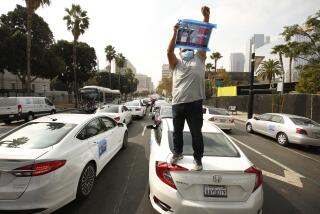State Court Underscores Liability of Employers
- Share via
SAN FRANCISCO — An employer can be held liable for injuries to a passenger in a company vehicle even though the employer may have warned the driver against carrying riders, the state Supreme Court ruled Monday.
The court by a 6-1 vote said an employer can be held responsible if its workers’ conduct could be reasonably anticipated, even if that conduct is a technical violation of company rules.
The case stemmed from a 1981 accident in which Modesto Perez, 23, lost a leg and an arm when he fell from a tractor driven by an uncle and got caught underneath the blades.
The uncle, Eulalio Garcia, invited Perez along for the ride because he wanted to teach him how to drive the tractor. The company had a rule against bringing passengers, and Garcia’s boss testified in the trial of Perez’s suit that he told Garcia about the rule, the court said.
Within Scope of His Work
But while Garcia was not authorized to carry the passenger, he had been assigned to drive the tractor in the almond orchard of his employer, Van Groningen & Sons of San Joaquin County, the court said, concluding that Garcia was acting within the scope of his work.
A jury hearing the suit by Perez against the almond grower found that Van Groningen & Sons was not liable. However, Perez’s lawyers appealed the trial judge’s refusal to tell jurors before they deliberated that since the tractor driver was acting within the scope of his employment, Von Groningen was liable for any negligence on the driver’s part.
“As long as it is clear that at the time of the injury the employee was following his employer’s instructions to disc the orchard, the fact that he was not authorized to take a passenger is immaterial,” Justice Cruz Reynoso wrote in the opinion.
In reaching its decision, the court relied on several previous cases in which employers have been held liable, including one in which an employee hit someone with a hammer. In that case, the court said the employer could be held liable because the attack stemmed from a work-related dispute.
More to Read
Inside the business of entertainment
The Wide Shot brings you news, analysis and insights on everything from streaming wars to production — and what it all means for the future.
You may occasionally receive promotional content from the Los Angeles Times.










